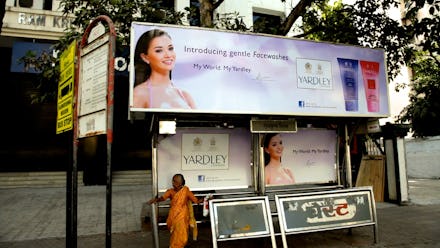Ads Around the World Illustrate a Surprising Problem With Beauty Standards

Countless campaigns, documentaries and activists in the U.S. have pushed back against sexist, violent and otherwise degrading images constantly used to sell products. But how do similar ads fare in other countries?
Not much better, according to filmmaker Elena Rossini whose upcoming documentary, The Illusionists, explores how globalization has affected beauty ideals in cultures around the world. The problem isn't necessarily that ads are worse in other countries, she said to Mic, but that ads around the world all look the same.
"Western beauty ideals — actually, man-made Western beauty ideals — have spread to the rest of the world through globalization and are now being upheld as models even in places like India and Japan," Rossini told Mic in February. "And they have very dangerous consequences."
And those ads can lead to body dissatisfaction among girls and women. Rossini traveled throughout North America, Europe, the Middle East and Asia to examine the global proliferation of Western beauty ideals, and the ads she found were shockingly similar. Here's what she encountered.
Tokyo
"Luxury brands invariably use Caucasian models for big-ticket items, who conform to a specific look: young, tall, thin and usually blonde with blue eyes," Rossini said. "This is really striking in places like Tokyo. In Ginza, the city's most prestigious neighborhood, I was surrounded by ads showing all these impossibly tall blonde women... whereas in the streets the local population could not have looked more different."
Beirut
Rossini's documentary cites Lebanon as having the most plastic surgery procedures per capita with about 1 in 3 women having had a procedure. One Lebanese student interviewed in Rossini's documentary sums up what this reality looks like: "If you walk around the streets of Lebanon, I think you'd realize that most people look the same, specifically people from a certain social class that have the money to have this many surgeries," she said.
Milan
"A youthful look seems to be the most prestigious commodity of all," Rossini said. "It's so hard to find women over 30 in ads in most places I've visited."
Mumbai
Rossini is not the only one to notice this global trend: Sociologists have also observed that, as she stated, "globalization — and the way American media has been exported to the rest of the world — has had a profound effect in the way people all over the world perceive beauty ideals," Rossini told Mic.
Paris
While French ads certainly still employ photo retouching, Rossini said she felt it was used a lot less than in other countries. "You can definitely notice crow's feet and fine lines and wrinkles in photos that appear in magazines and billboard ads," she said. "There is more authenticity here, a desire to see a more 'natural' look."
But Rossini remains hopeful that especially as activists and other advocates push back on these ads — and rigid Western beauty standards more generally — change is possible and perhaps even imminent.
"I've noticed a trend towards more diversity in advertising — especially in the last couple of years," Rossini said. But ultimately, she said in February, she would love to see "advertisers embracing empowerment as a selling tool instead of insecurity."